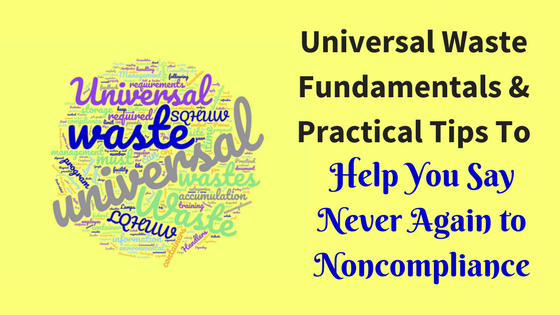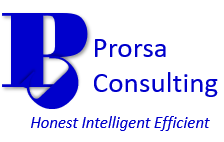Universal Waste Fundamentals and Practical Tips to Help You Say Never Again to Noncompliance
By : Admin -

I consider universal waste management a win-win. It protects the environmental without the more involved requirements associated with other hazardous wastes and promotes recycling. Subsequently, the relative simplicity of these wastes usually makes them a secondary concern for most environmental compliance programs.
However, this leaves it as low-hanging fruit when thinking about compliance. In this article we’ll cover a short refresher on this topic and some straightforward tips to help keep your site’s program in compliance.
Universal Waste Identification
As with any environmental regulation, you must assess whether the rules apply to your site operations. Only certain hazardous wastes can be managed as universal wastes. The current federal program covers, the following items:
- Batteries, such as nickel-cadmium;
- Pesticides;
- Mercury-containing Equipment; and,
- Lamps, like fluorescent and neon.
There is currently a proposal to add aerosol cans to the federal program. You can read more about the proposal here.
Depending on your state, other wastes may be eligible for management as under the universal program, such as:
- Aerosol Cans;
- Antifreeze;
- Ballasts;
- Barometers;
- Cathode Ray Tubes (CRTs);
- Electronics;
- Oil-based Finishes;
- Paint and Paint-related Wastes; and,
- Hazardous Waste Pharmaceuticals.
LQHUW vs. SQHUW
Regulations name two categories of handlers, Small Quantity Handlers of Universal Waste (SQHUW) and Large Quantity Handlers of Universal Waste (LQHUW). SQHUW have less than 11,000 pounds (5,000 kg) stored on site at any time. Also, handlers in this category are not required to obtain an EPA identification number.
Alternately, LQHUW have 11,000 pounds (5,000 kg) or greater of universal waste stored at their facility at any given time and must acquire an EPA identification number. Under this category there is no maximum quantity limit on the amount of universal waste accumulation. However, LQHUW must keep shipment records of these wastes sent to offsite facilities.
The Basics – Universal Waste Management 101
The general requirements for universal waste management are similar for both SQHUW and LQHUW. The storage time limit is one (1) year for both handler categories. In addition, storage conditions must meet the following requirements:
- Accumulation containers must be sturdy, compatible with the waste they hold, and remain closed during storage, except when actively adding wastes to the container.
- The containers must be labelled to show the type of universal waste being stored, i.e. Waste – Batteries or Universal Waste – Lamps.
- A practice must be in place to document the length of accumulation time for the universal waste.
Furthermore, employee training is required for those workers handling and managing this type of waste at your site. Basic safe handling, storage requirements, and any other job-specific responsibilities should be included in the training program.
Practical Tips to Maintain Compliance
- Accumulate the waste based on calendar years. Start new accumulation containers on January 1st and dispose of any containers holding waste on or before December 31st of each year.
- Mark each accumulation container with the date universal waste was first placed in the container to document accumulation time.
- Incorporate required employee training into other required environmental training, such as stormwater or spill prevention.
- Include the program in regular site inspections/spot checks.
- Keep any required shipping records in an organized manner and designated location.
Additional Related Articles for You to Enjoy
Environmental Pollution Prevention Strategies You Should Try Before Treatment
Environmental Compliance Trends: Discover What’s Hot on the Radar Now
Waste and Hazardous Waste Management Tips for Tackling Risk in Your Small Business
Parting Words
Universal waste is quite easy to manage but still needs attention in order to avoid noncompliance. Using the information contained in this post, you’ll have a good blueprint to ensure proper management at your facility. For more information, visit the EPA’s Universal Waste page. Moreover, you will find the standards governing the program at 40 CFR 273.
Prorsa Consulting is available to assist you with your EHS compliance, analysis, and management system needs. Check out our Services page for more information.
Your feedback on this blog’s content is always encouraged. If you found this information useful, be sure to like and/or share below! You can also give your feedback via our Contact Us page.
You can follow Prorsa Consulting on Google+, LinkedIn, Pinterest, and Twitter for regular content updates.
How would you like to gain access to additional, exclusive updates and tools to improve your EHS efforts? You can do just that by sign-up to a free subscription to the Prorsa Consulting Newsletter. Take a few seconds and fill out the sign-up form below.
